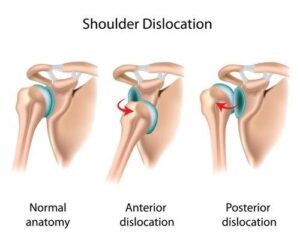
Dislocated Shoulder Surgery in Dubai at Emirates Hospitals Group. Our team includes some of the best board-certified orthopedic surgeons in Dubai, ensuring patients receive top-tier medical care. One of the common shoulder injuries we treat is shoulder dislocation. At our specialized Dislocated Shoulder Treatment Clinic, we focus on providing accurate diagnosis, effective treatment, and comprehensive rehabilitation to restore shoulder stability and function.
Understanding Shoulder Dislocation
A shoulder dislocation occurs when the ball of the upper arm bone pops out of the socket. This can happen due to:
- Falls: Landing on an outstretched arm is a common cause of shoulder dislocation.
- Contact sports: Collisions or tackles in sports like football, rugby, or basketball can dislocate the shoulder.
- Seizures: Uncontrolled muscle contractions during a seizure can dislocate the shoulder.
- Loose ligaments: Individuals with naturally loose ligaments or a history of shoulder instability are more susceptible to dislocations.

Symptoms of a Dislocated Shoulder
The symptoms of a dislocated shoulder are usually quite obvious:
- Severe pain: Intense pain is the hallmark symptom, often accompanied by a feeling of popping or snapping during the injury.
- Deformity: The shoulder may appear visibly out of shape or deformed.
- Loss of function: The inability to move the shoulder or a significant limitation in range of motion.
- Numbness or tingling: Numbness or tingling sensations may occur in the arm or hand due to nerve irritation.
Seeking Treatment for a Dislocated Shoulder
A dislocated shoulder is a medical emergency. It’s crucial to seek immediate medical attention at Emirates Hospitals Group for prompt treatment and to minimize the risk of complications. Our team of experienced doctors will assess your situation and provide the necessary care.

Diagnosing a Dislocated Shoulder
The diagnosis of a dislocated shoulder is typically straightforward. Our doctors at Emirates Hospitals Group will likely:
- Perform a physical examination: This will involve assessing the shoulder for deformity, tenderness, swelling, and range of motion.
- Order X-rays: X-rays will confirm the dislocation and help identify any bone fractures associated with the injury.
Non-Surgical Treatment Options
- Closed Reduction:
- Procedure: This involves a physician manually manipulating the arm to guide the humeral head back into the socket. This procedure is typically performed under sedation or anesthesia to minimize discomfort.
- Post-Reduction Care: After the shoulder is back in place, the patient’s arm is usually immobilized in a sling for a few weeks to allow the tissues to heal.
- Medications:
- Pain Management: Pain relievers and anti-inflammatory medications are prescribed to reduce pain and swelling.
- Physical Therapy:
- Rehabilitation Program: Once initial pain and swelling have subsided, a structured physical therapy program focuses on restoring range of motion, strengthening the shoulder muscles, and improving joint stability.
Surgical Treatment
For patients with recurrent dislocations or severe shoulder instability, surgical intervention may be necessary:
- Arthroscopic Surgery:
- Procedure: This minimally invasive surgery involves small incisions and the use of an arthroscope (a small camera) to repair torn ligaments and tissues. This helps restore stability to the shoulder joint.
- Recovery: Post-surgery, the arm is immobilized, and a detailed rehabilitation program is followed to regain shoulder function.
- Open Surgery:
- Procedure: In some cases, open surgery may be required to repair significant damage to the shoulder structures. This involves a larger incision for direct access to the shoulder joint.

Recovery Process and Protocols
Post-Treatment Rehabilitation
- Immobilization: Initial period of immobilization in a sling to allow healing of the shoulder structures.
- Early Rehabilitation: Gentle range-of-motion exercises to prevent stiffness, followed by progressive strengthening exercises.
- Advanced Rehabilitation: Focuses on restoring full shoulder function, strength, and stability. Activities gradually increase in intensity under the guidance of a physical therapist.
Frequently Asked Questions
A dislocated shoulder typically occurs due to a sudden impact or force that forces the upper arm bone (humerus) out of the shoulder socket (glenoid). This can happen during falls, sports injuries, or accidents where the arm is forcefully extended or twisted.
Signs of a dislocated shoulder include severe pain, inability to move the shoulder, and a visible deformity where the shoulder looks out of place or bulges unnaturally. There may also be numbness or tingling down the arm. It’s essential to seek immediate medical attention for proper diagnosis and treatment.
Treatment options depend on the severity of the dislocation. Initially, the shoulder may be manually reduced (put back into place) under sedation or anesthesia. Following this, patients may undergo conservative treatment with a sling, pain medications, and physical therapy. Severe cases or recurrent dislocations may require surgical intervention to repair damaged ligaments and stabilize the shoulder joint.
Recovery involves a period of immobilization in a sling to allow the shoulder to heal. Physical therapy is crucial to regain strength, range of motion, and shoulder stability. The timeline for recovery varies depending on the severity of the dislocation and the individual’s response to treatment, with full rehabilitation typically taking several months. Emirates Hospitals Group provides comprehensive post-operative care and rehabilitation programs to facilitate optimal recovery and minimize the risk of future shoulder instability.
Request an appointment
Please complete the details and we will book you shortly.
Request an appointment
Please complete the details and we will book you shortly.



